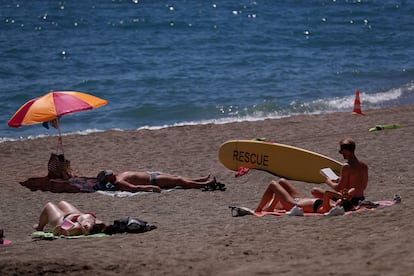Want to repair your cells? Take them on vacation
Chronic stress is a serious enemy of physiological balance; that is why taking a break is important to avoid cell damage

We may not even realize it, but many of us live in conditions of almost continuous stress. From the moment that the alarm brings us back from the land of dreams until it is time to return there again, we are subject to different forms of stress that can affect us badly.
Chronic stress is a serious enemy of physiological balance, and one of the main triggers of diseases like metabolic syndrome, type 2 diabetes, cardiovascular diseases, some neurodegenerative diseases such as Parkinson’s and chronic inflammation. Illnesses closely related to our life habits.
That is why taking a break is important to relieve stress and repair cell damage. The question is: do we actually rest while on vacation? Or do we become even more stressed when we are rushing in the middle of a stampede, stuck in long airport lines and racing to put our umbrella on the first line of the beach?
The side effects of stress
We are constantly receiving information in the form of sensory stimuli from the outside, but also from the inside. This is how we detect hunger, thirst, sleepiness, pain, discomfort and more. While many of these sensations rely on nerve conduction, others are produced because our cells and organs release substances that inform other cells and organs. These substances are known as local factors and hormones.
For example, when we need to react immediately to defend ourselves from danger, we release substances like adrenaline, norepinephrine and cortisol, which activate the organs so they produce a rapid response that either makes us alert or allows us to escape.
These stress hormones request a response from our body, either defensive or offensive, that is necessary for survival. We notice it immediately in symptoms such as dry mouth, sweaty hands, increased heart rate or headaches. The problem is that we usually get stressed in the office, on the couch, at home, in the supermarket or even while chatting with friends. In those situations, our body receives signals of danger, but our muscles and organs do not respond to them – we neither fight nor flee.
When that “contradiction” becomes permanent, it causes serious problems. Chronic stress keeps our cells in a state of continuous activation that causes molecular and cellular damage, chronic inflammatory responses and a whole list of side effects that affect our health. The solution? To loosen up a little.
Necessary relaxation: the effect of endorphins and other hormones
The effects of rest and relaxation on our cells are more than confirmed. The scientific evidence indicates that rest and restorative sleep help to eliminate the accumulated damage in them, and to recover the natural rhythms of sleep and wakefulness.
Melatonin (the “sleep hormone”) plays an essential role here, activating the elimination of damaged cellular structures. This stops cell waste from accumulating and prevents neurodegenerative diseases, such as Alzheimer’s, from progressing.
On the other hand, a pleasant vacation will release endorphins in our body. Known as the “happy hormones,” they are small proteins that stimulate the brain’s pleasure centers. They are considered endogenous opioids, and our neurons release them when we are relaxed, when we are happy and when we exercise. Although the molecular effects of these neurotransmitters are not entirely clear, some evidence indicates that they could prevent the progression of neurodegenerative diseases.
Another neurotransmitter that is released when we are relaxed is serotonin, another substance known as a happy hormone. Its deficiency has been associated with multiple diseases, particularly chronic fatigue, but also dementia or serious Covid-19.
Vacations improve health
Taking all these factors into account, it is clear that enjoying a relaxing vacation that takes us away from the everyday stress is important to recover the physiological balance that allows us to maintain a good health.
Simply lowering the levels of stress hormones, while increasing those that produce pleasure and relaxation, helps the cells eliminate accumulated damage and prevent multiple diseases. And you don’t have to go to exotic destinations or dream beaches: just put aside the pressures, rest without worries and enjoy. With that we gain a lot in health and our cells appreciate it.
And when the holidays are over, it would not hurt to keep in mind how good well-organized rest is for our body.
Guillermo López Lluch is a professor of cell biology, associate researcher at the Andalusian Center for Developmental Biology and researcher in metabolism, aging and immune and antioxidant systems at the Pablo de Olavide University.
Tu suscripción se está usando en otro dispositivo
¿Quieres añadir otro usuario a tu suscripción?
Si continúas leyendo en este dispositivo, no se podrá leer en el otro.
FlechaTu suscripción se está usando en otro dispositivo y solo puedes acceder a EL PAÍS desde un dispositivo a la vez.
Si quieres compartir tu cuenta, cambia tu suscripción a la modalidad Premium, así podrás añadir otro usuario. Cada uno accederá con su propia cuenta de email, lo que os permitirá personalizar vuestra experiencia en EL PAÍS.
¿Tienes una suscripción de empresa? Accede aquí para contratar más cuentas.
En el caso de no saber quién está usando tu cuenta, te recomendamos cambiar tu contraseña aquí.
Si decides continuar compartiendo tu cuenta, este mensaje se mostrará en tu dispositivo y en el de la otra persona que está usando tu cuenta de forma indefinida, afectando a tu experiencia de lectura. Puedes consultar aquí los términos y condiciones de la suscripción digital.








































